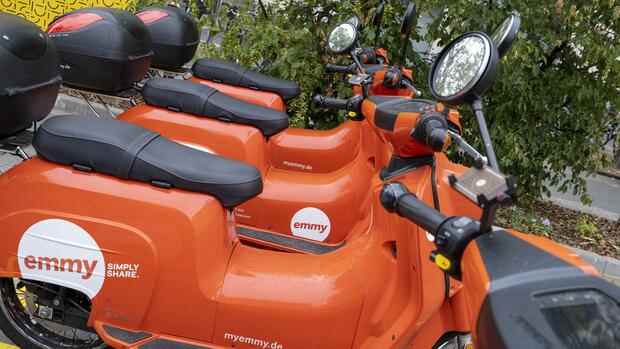The scooters will be part of a diverse fleet under the Go To brand.
(Photo: imago images / snapshot)
Hamburg The field of sharing providers in major German cities continues to grow: the Go To Global provider is entering the German market. For this, the Israelis buy the Berlin motor scooter sharer Emmy. It is to become the core of a fleet of cars, mopeds as well as e-scooters or e-bicycles. That’s what Go-To-Global boss Gil Laser told Handelsblatt.
Emmy started with red e-Vespas in Germany as early as 2015 – well before the providers of the lighter e-scooters. However, the Emmy offer is only available in Berlin, Hamburg and Munich. Most recently, at the end of 2020, Emmy collected a “low double-digit million amount” in a financing round from Munich-based impact investor Bonventure, partly as a loan for new mopeds. At the same time, Emmy let partnerships with, for example, the Stadtwerke Düsseldorf expire.
Now the investors, including the Berlin sponsor IBB and Business Angels, are selling the company to Go To Global. The partners do not name the price. “The sale supports our vision of making our own car superfluous,” said Emmy co-founder Valerian Seither in explaining the move.
The 35-year-old should stay on board and implement the conversion to the go-to model in the three Emmy cities. The Go To provider with 200 employees and 5000 vehicles is currently active in Israel, Madrid and Malta.
Top jobs of the day
Find the best jobs now and
be notified by email.
For the buyer, the 300,000 existing Emmy customers are particularly interesting, said Laser. You should also be able to rent cars from the middle of next year – either by the minute, as with Share Now, We Share and Miles, or by pre-order. In addition, a micromobility solution such as e-scooters or e-bikes is to be added. Laser also wants to address corporate customers.
Tough competition
Go To dares to venture into a competitive market. Share Now is causing sustained losses for its investors Daimler and BMW, and VW is also recording start-up losses with We Share in Berlin and Hamburg. The independent provider Miles proudly reported a profitable month last year – but only operationally before depreciation (Ebitda). Miles achieved a turnover of around 20 million euros in 2020. Even Emmy, with its 3000 mopeds and 120 employees, does not yet earn any money and, like the other providers, suffered from the corona measures. According to the Federal Gazette, the Emmy operator Electric Mobility Concepts had already incurred a loss of almost 9.5 million euros in 2019.
Go-To boss Laser said he wanted to set himself apart from the competition with a “better product”. By combining different vehicles from minibuses to scooters, the 44-year-old hopes to gain deeper knowledge of customer needs and the possibility of building his own ecosystem. Vouchers across the vehicle types are possible, for example. At the same time, the Go To brand will be more visible to users in the city than the competition thanks to the wide range of vehicle types.
However, Go To encounters similar concepts: Free Now, the former Mytaxi app, now brings together the offers of various providers such as Sixt Share and Tier in its app. So far, Emmy has also been there, but could soon withdraw under the new brand. The regional transport associations also have their own apps that are open to partners. This week, after Sixt and the VW shuttle Moia, the Hamburg association HVV is also integrating animal scooters and Miles cars into its “HVV Switch” app. The Berlin app “BVG Jelbi” brings together even more partners.
Go-To boss Laser is currently attracting fresh money from investors for the expansion into Germany – in addition to the $ 23 million risk capital that has been collected so far. Laser left it open how big this third growth round (Series C) should be. The German team around Seither and Emmy co-boss Alexander Meiritz will then also lead the expansion into the Netherlands. Laser also wants to go to Italy and Portugal.
The aim is to become the market leader in multimodal sharing offers in Europe, said Laser. But further acquisitions are not ruled out. Sales are expected to double to $ 50 million in 2022. According to his ideas, it should be 100 million dollars in 2023.
More: Car sharing needs more ideas and less controlling
